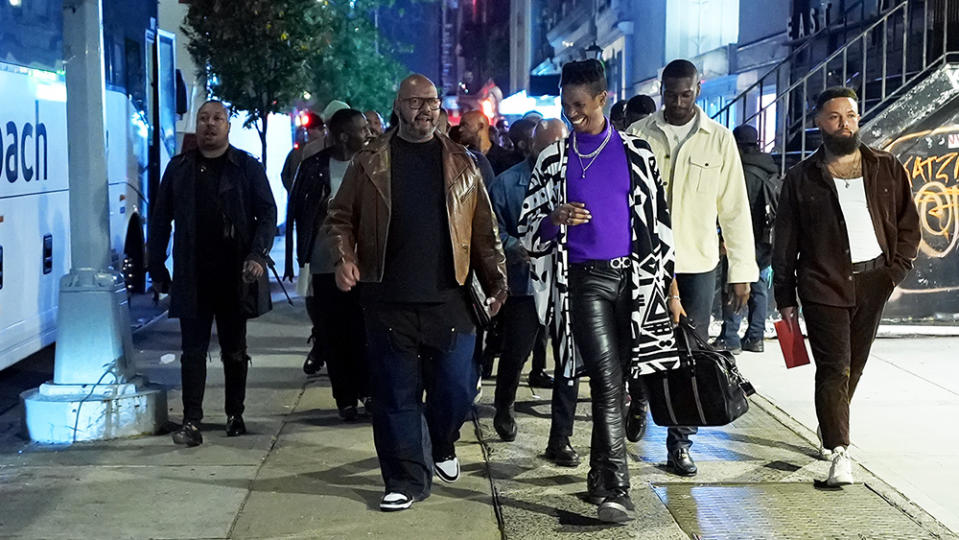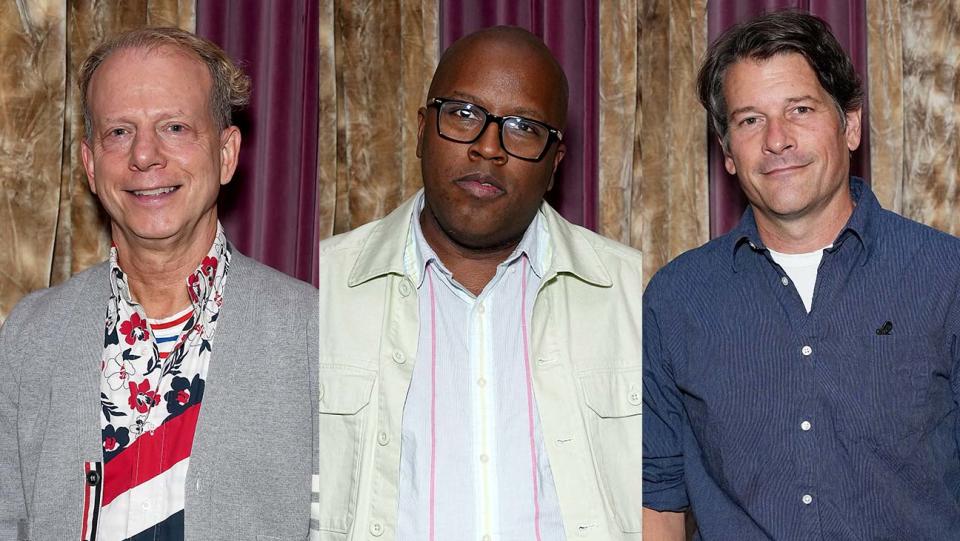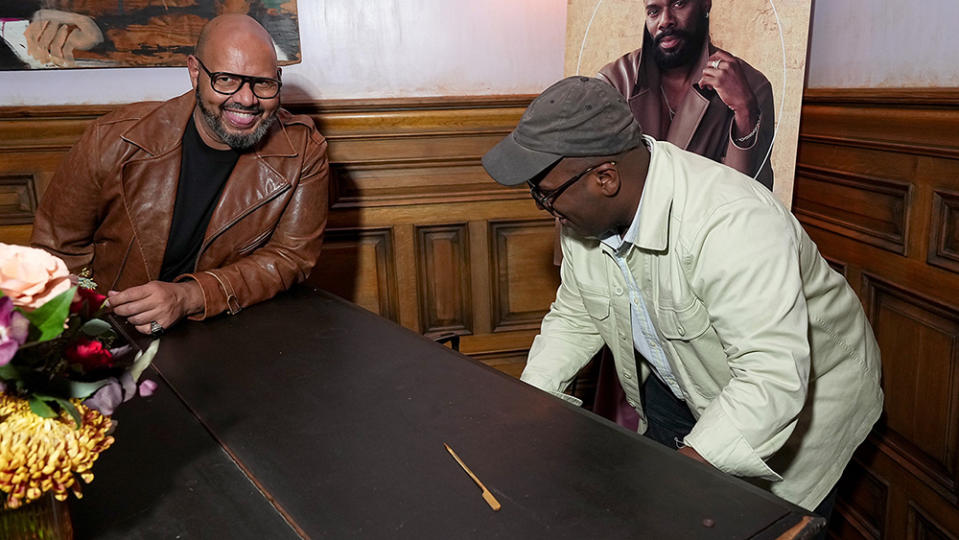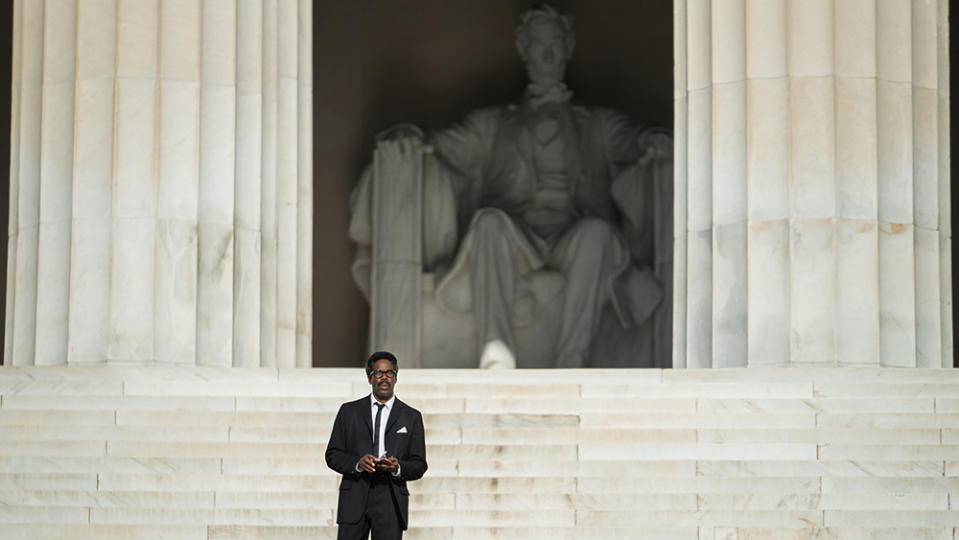How ‘Rustin’ and Native Son Teamed to Reclaim the Civil Rights Activist’s History as a Rallying Call
- Oops!Something went wrong.Please try again later.
- Oops!Something went wrong.Please try again later.

A handful of hours before George C. Wolfe’s Rustin would make its New York premiere as NewFest’s opening night selection on Oct. 12, more than 100 Black queer members of the Native Son collective gathered in The Chelsea Hotel’s Lobby Bar, drinks in hand and under a golden aura of light, dipping in and out of excited conversation.
“It’s really emotional for me,” Native Son founder Emil Wilbekin told The Hollywood Reporter. “Coming into this room and seeing all these beautiful Black queer men — who are legends, icons, mentors, new in their careers — you can feel the joy and love because we don’t have spaces like this.”
More from The Hollywood Reporter
Coordinated in conjunction with Netflix, the Rustin film team and Native Son — a collective of Black gay and queer men focused on elevating the voices, visibility and lived experiences of their community — the gathering counted Rustin producer Bruce Cohen and production designer Mark Ricker among its guests. They were joined by Tony and Pulitzer Prize Award winner Michael R. Jackson, Tony Award-winning choreographer George Faison, actors Bradley Gibson and Eric Anderson and more from the worlds of style, music, activism and entertainment.
Later that evening, those guests collectively marched to Chelsea’s SVA Theater, where they attended the biopic’s red carpet premiere as part of a unified effort to remember and further the legacy of the civil rights icon Bayard Rustin.

“It’s a moment, for me personally, of reflection,” Jackson said. “I moved to New York, almost 25 years ago as an 18-year-old. I was starting at the bottom and I didn’t really have a cohort of other Black gay men around me. I had that in high school, but that was in the mid-to-late ’90s when there was just starting to be a shift among white gay people. So I got to New York, I was at the bottom of the barrel and I never imagined that there would be this many people telling Black gay stories, or stories that include Black gay people at the volume that it is today. It’s truly a moment to reflect on how much progress and change there has been since I first got here.”
Portrayed by Colman Domingo in the upcoming Netflix film out Nov. 3, the architect of the March on Washington for Jobs and Freedom is an example of how people who make momentous forward progress possible are frequently forgotten to time.
“Everybody knows the legacy of Martin Luther King and that heroic speech — and well they should. But it took a whole lot of effort to get 250,000 people to show up in Washington, D.C., a segregated city, to be a part of that wondrous moment,” Wolfe, the film’s director said of Rustin’s work on the march. “So let’s know about the people who worked to organize and plan it. Let’s not just celebrate the obvious. Let’s celebrate that accomplishment, just the mere act of the march. Just the mere fact of the march is something that one can learn from.
“Not everybody has the oratory skill set of Martin Luther King, [Jr.] to deliver a speech like that,” he continues, “but everyday we can organize and everyday we can listen.”
The intimate celebration of Rustin’s life and legacy fittingly took place only blocks from where the civil rights activist spent much of his life as a longtime Penn South resident, giving the gathering even more significance for those in attendance.

“The theater itself that we’re seeing the movie is on the property between W. 23rd and W. 29th Streets and Eighth and Ninth Ave. It’s that whole series of brick buildings with balconies. That’s what we recreated for the film,” said Ricker. “There were initially 10 or 12 buildings that formed this complex that was dedicated in 1962 by John F. Kennedy. Bayard moved during 1962 into this brand new apartment, which is still there. Walter Nagel, his partner, still lives in the unit.”
There, in the Chelsea Hotel Lobby Bar, 50 Native Son members — alongside a hand-selected mentor or mentee — mingled as part of an intergenerational gathering, bringing Rustin’s legacy (frequently described by those remembering him as forgotten or actively erased) to new generations of queer Black men. “Native Son events are intergenerational because of the lost generation, because I don’t have a lot of people to look back at because they’re gone,” Wilbekin says.
“When I started Native Son I was thinking about Bayard Rustin, James Baldwin, Alvin Ailey — mostly men who didn’t have the privilege of being out in their lives,” continued the former editor-in-chief of Vibe. “A lot of them pushed the boundaries of that, but I wanted to create the space for the next generation to stand on their shoulders and know who those men were, but to also know who we are.”
For the Native Son founder, the evening had a two-fold mission, including strengthening that connection among those in the room and to Rustin’s drive and work. “So many of us are still coming out and finding our voices amid stigma and shame, so when we can see someone who looks like us who was brilliant, unapologetic and pushed past respectability politics, and religious factions and really said you’re going to see me? That’s important,” said Wilbekin. “We’re in the margins, we’re always the supporting characters, but I want to show that no, we are actually the stars. We’re the ones who make shit happen.”
He also wanted to broaden the reach of a film that offers Black gay and queer men the chance to see themselves in a way they rarely do, even today, in hopes it will ignite the fire necessary to generate more progress.

“The movie is super important because we are able to see ourselves in someone who existed in the ’50s, ’60s and ’70s; who dealt with the policing of Black bodies; who dealt with the shame and stigma of being a Black gay man in a time when it wasn’t accepted — and to know that he survived and thrived,” the Native Son founder says. “Most people don’t know who he is, but this film really tells the story that he wasn’t just one of the tenants of the civil rights movement. The March on Washington was his idea. He built it, he saw it. I think we need to know that from a historical perspective, so we can be free today.”
The evening featured custom cocktails tied to the film’s themes of owning your power and a toast by Wilbekin to Rustin’s memory before the group posed for portraits, captured by Myles Loftin, and a group photoshoot conducted by Keith Majors. While the evening was celebratory, for Wolfe, it was about more than gathering a community. It was about a chance to put “organization behind the activism and connect as many people as we possibly can to build coalitions.”
“Bayard was committed and ferocious and Bayard was determined, so how are we picking up that mantle? He did what he did in defiance of the time. What are we doing now in defiance of the time?” he told THR a day after the event. “We did this movie about this man who history ignored, and we’re celebrating in his accomplishments and his strength and his power. So how can we take his sense of organization, how can we take his sense of responsibility — his expansive understanding of humanity — and manifest that?”
For Cohen, Rustin has the power to bring to the general consciousness the work of the civil rights activist in part because of it has the backing of Higher Ground Productions. “The fact that this his legacy, which isn’t what it should have been, is now going to exist being brought to you by the Obamas — as a gay man it makes it all the more moving because having their support and presence will mean that even more people will want to see it.”
Cohen notes this isn’t the first time Bayard’s legacy has been celebrated around the film by his community, with the film getting an early screening at GLAAD’s Black Queer Creative Summit earlier this year. His story had also been told for the screen in the doc Brother Outsider: The Life of Bayard Rustin, which brought it to a segment of the LGBTQ community twenty years ago.
“It was at OutFest, and it actually played at a lot of gay and lesbian film festivals around the country. There was a moment where the gay community knew who Bayard Rustin was and had celebrated him as an icon,” he told The Hollywood Reporter. “But I was very surprised to learn that he had not been passed down, so when Dustin Lance Black sent me the script after he had written it, which was between 2018 and 2019, I immediately wanted to help get the movie made.”
Rustin’s was a life of work that resulted in a “historic, world changing event,” but for which he was ultimately left behind because “it didn’t serve the purposes of the civil rights movement to have an openly gay man,” Cohen said.
“They stood by him when it counted, but then when the Big 10 went to the White House, Rustin wasn’t invited,” he continued. “That was pretty much the end of his narrative in the civil rights movement — until now.”
While modern LGBTQ Americans aren’t quite living in the same world as Rustin, the arrival of Wolfe’s film, co-written by Black and Julian Breece, is timely, as threats to progress won by activists for both America’s Black and LGBTQ communities are renewed.
“Rustin has this great line in the film where he says, ‘Counting on the courts to erase racial inequity — that’s madness.’ When he’s saying it in 1963, you understand it because the Supreme Court had passed Brown v. Board of Education and the South hadn’t desegregated,” Cohen says. “When we read the line in 2019, it didn’t really have modern relevance, because the Supreme Court didn’t take people’s rights away. Cut to now and that’s what’s happening. Counting on the Supreme Court to fix anything is now madness.”

That makes Rustin’s story all the more important to tell in this moment. “Those who quote-unquote win, get to tell their version of the story. So how do we protect history so that people like him are never forgotten? And how do we protect history so that people can’t redefine what our history, our truth and our legacy is?” Wolfe told THR. “We know his story, and he did remarkable things, so now it’s on us. What are you going to do? I’m claiming his history and viewing it as a rallying call.”
Best of The Hollywood Reporter
Martin Scorsese’s 10 Best Movies Ranked, Including 'Killers of the Flower Moon'
13 Times Hollywood Predicted the Scary (or Not So Scary) Future of AI

